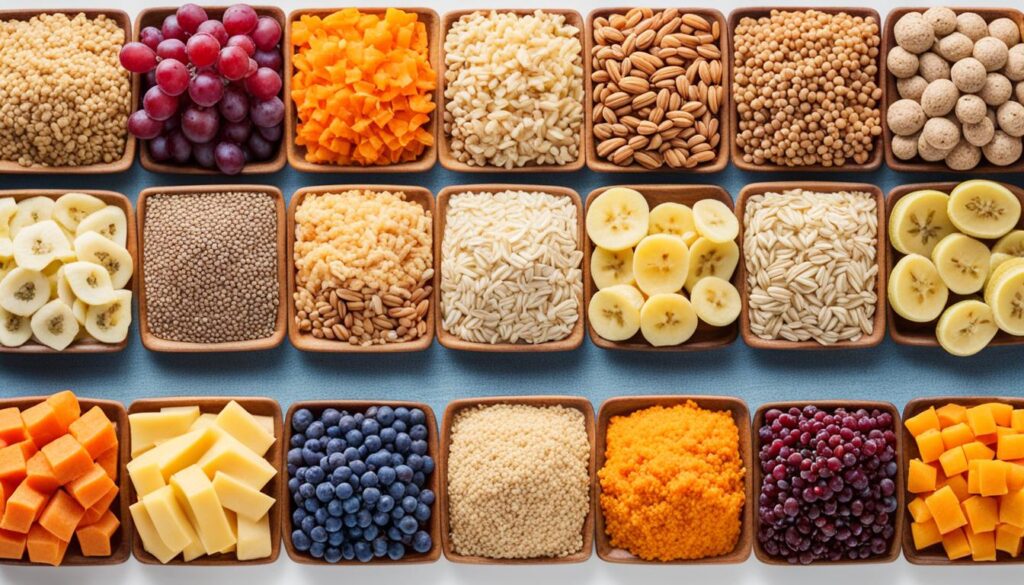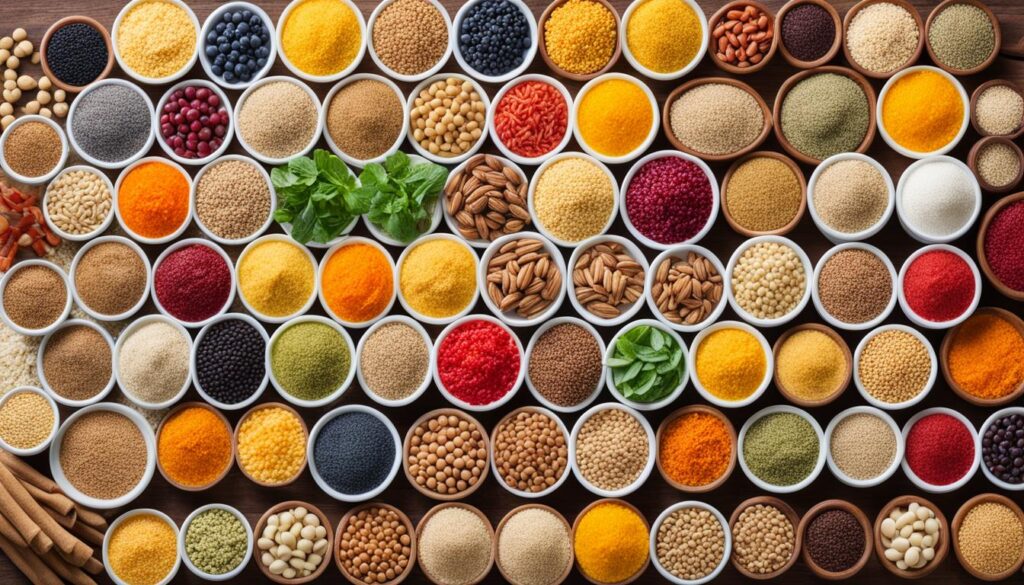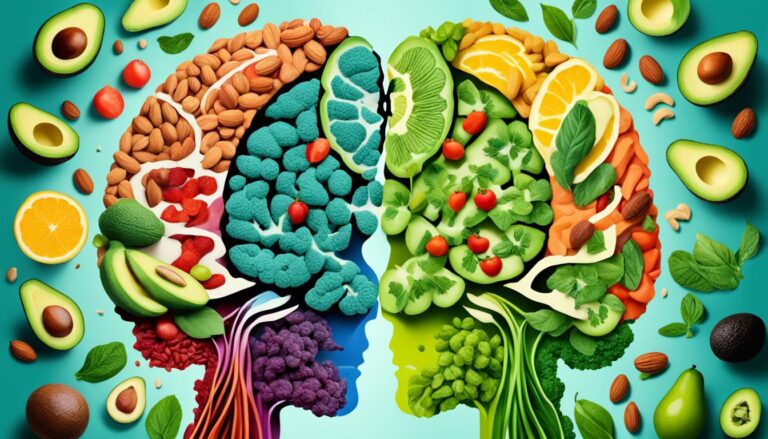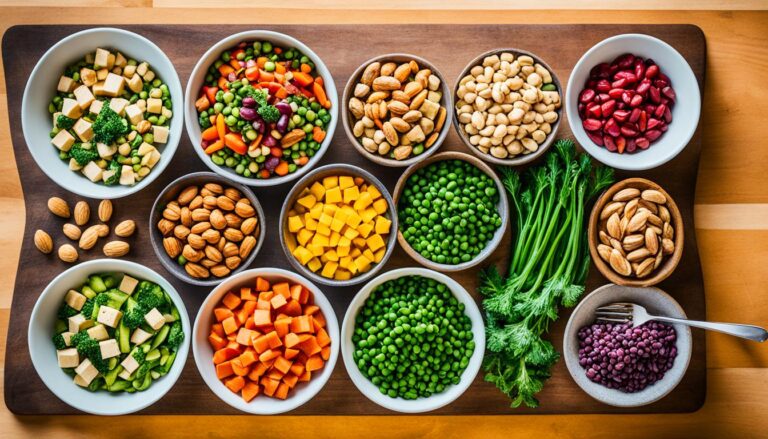Carbohydrates often get a bad rap in popular diets. But did you know that they are actually an essential part of a healthy diet?
In this comprehensive guide, we will dive into the world of carbohydrates, exploring their different types and providing you with 10 examples of healthy carbohydrate foods to incorporate into your meals.
Whether you’re looking to maintain a balanced diet, follow a low-carb lifestyle, or simply make healthier choices, this guide will help you understand the importance of carbohydrates and give you delicious options to fuel your body.
Key Takeaways:
- Carbohydrates are an essential part of a healthy diet.
- They provide the body with energy for various bodily processes.
- There are different types of carbohydrates, including complex and simple carbs.
- Choosing healthy carbohydrate foods is important for maintaining a well-rounded diet.
- Carbohydrates can be included in special diets, such as low-carb or gluten-free diets.
Understanding Carbohydrates and Your Health
Before delving into specific carbohydrate examples, it’s important to understand the role of carbohydrates in our overall health.
Carbohydrates serve as the body’s primary fuel source, providing the energy necessary for proper functioning and supporting various bodily processes. When consumed, carbohydrates are broken down into glucose, which fuels our cells and powers essential functions.
The Essential Role of Carbohydrates as Fuel
Carbohydrates are vital for optimal health as they provide the energy required for everyday activities and exercise. They act as a preferred source of fuel for the brain and muscles, enabling us to think clearly, maintain focus, and power through physical activities.
Whether it’s going for a jog or engaging in a rigorous workout, carbohydrates play a crucial role in sustaining energy levels and enhancing performance.
Complex vs. Simple Carbohydrates
Carbohydrates can be categorized into two main groups: complex carbohydrates and simple carbohydrates. Complex carbohydrates, such as whole grains, legumes, and vegetables, contain longer chains of sugar molecules and take longer to digest.
They provide sustained energy, as they are digested slowly and release glucose into the bloodstream gradually. On the other hand, simple carbohydrates, found in foods like table sugar, honey, and fruit juices, contain fewer sugar molecules and are digested quickly, resulting in a quick energy boost.
It’s important to strike a balance between complex and simple carbohydrates in your diet to ensure a steady release of energy throughout the day.
Recommended Carbohydrate Intake for Optimal Health
The recommended carbohydrate intake varies depending on factors such as age, sex, activity level, and overall health goals. The Dietary Guidelines for Americans suggest that carbohydrates should constitute 45-65% of your daily caloric intake.
For a 2,000 calorie diet, this equates to approximately 225-325 grams of carbohydrates per day. However, individual needs may vary, so it’s essential to consult with a healthcare professional or registered dietitian to determine the appropriate carbohydrate intake based on your specific needs and health goals.

What are 10 carbohydrates examples?
Now let’s explore 10 examples of healthy carbohydrate foods that you can incorporate into your diet. These options are nutrient-rich, provide sustained energy, and offer a range of health benefits. From whole grains to fruits and legumes, these carbohydrate sources can be enjoyed in various recipes and meals.
1. Whole Grain Bread
2. Brown Rice
3. Quinoa
4. Sweet Potatoes
5. Oats
6. Apples
7. Berries (e.g., strawberries, blueberries, raspberries)
8. Chickpeas
9. Black Beans

These carbohydrate examples not only provide essential nutrients but also offer a variety of flavors and textures. Whether you’re making a hearty stew with lentils or enjoying a refreshing fruit salad, incorporating these healthy carbohydrate foods into your daily meals can help support your overall well-being.
The Importance of Fiber in Carbohydrates
Fiber is a type of carbohydrate that offers numerous health benefits and is an important component of a healthy diet. While often overlooked, fiber plays a vital role in our overall well-being.
Benefits of High-Fiber Carbohydrates
High-fiber carbohydrates provide bulk to our diet, promoting healthy digestion and preventing constipation. They also help regulate blood sugar levels, making them an excellent choice for individuals with diabetes or those looking to manage their weight.
Additionally, consuming fiber-rich foods can aid in reducing the risk of heart disease, stroke, and certain types of cancer.
Moreover, foods high in fiber are typically low in calories, making them ideal for individuals who are watching their calorie intake. They provide a sense of fullness, which can help control appetite and prevent overeating. Including high-fiber carbohydrates in your diet can contribute to maintaining a healthy weight and overall wellness.
Carbohydrate Sources Rich in Fiber
Wondering which foods are rich in fiber? Look no further! Here are some excellent sources of fiber-rich carbohydrates that can easily be incorporated into your daily meals:
| Food | Fiber Content (per serving) |
|---|---|
| Avocado | 13 grams |
| Lentils | 15.6 grams |
| Split Peas | 16.3 grams |
| Raspberries | 8 grams |
| Chia Seeds | 10.6 grams |
| Quinoa | 5.2 grams |
Including these fiber-rich foods in your meals can not only enhance the nutritional value but also contribute to better digestion and overall health.

Including Carbohydrates in a Balanced Diet
When it comes to maintaining a balanced diet, carbohydrates play a crucial role. However, it’s important to consider not only the types of carbohydrates you consume but also the portion sizes and nutrient density. Let’s explore how you can incorporate carbohydrates into your diet in a healthy and balanced way.
Proper Portion Sizes of Carbohydrate Foods
Portion control is key when it comes to carbohydrates. While they are an essential energy source, consuming too much can lead to weight gain and blood sugar imbalances.
To maintain a healthy diet, it’s important to be mindful of your portion sizes. Try using smaller plates and bowls to control your serving sizes, and avoid going back for second helpings. Remember, moderation is key!
Nutrient Density and Carbohydrate Selection
Not all carbohydrates are created equal in terms of their nutrient content. To maximize the health benefits of carbohydrates, choose options that are nutrient-dense.
This means selecting carbohydrates that provide a wide range of essential vitamins, minerals, and fiber. Opt for whole grains, fruits, vegetables, and legumes, which are rich in nutrients and offer numerous health benefits.

Choosing healthy carbohydrates not only provides your body with the energy it needs but also ensures that you’re getting essential nutrients to support your overall health. By considering portion sizes and selecting nutrient-dense options, you can include carbohydrates in your diet while maintaining a healthy and balanced eating plan.
Healthy Carbohydrate Choices for Special Diets
Special diets, such as low-carb and gluten-free, often require a careful selection of carbohydrate options. However, it’s important to note that there are still plenty of delicious and healthy carbohydrate choices available, even within the constraints of these diets.
In this section, we will explore the various ways you can incorporate carbohydrates into low-carb and gluten-free diets while prioritizing your health and dietary needs.
Carbohydrates on a Low-Carb Diet
Following a low-carb diet doesn’t mean completely eliminating carbohydrates from your meals. It simply involves choosing the right types of carbohydrates and consuming them in moderation.
Opting for low-carb vegetables like leafy greens, broccoli, and cauliflower can provide essential nutrients while keeping your carbohydrate intake in check. Additionally, incorporating healthy fats and proteins into your meals can help balance out the effects of carbohydrates and promote satiety.
Here are some low-carb carbohydrate options for your diet:
| Low-Carb Carbohydrate Options |
|---|
| Leafy greens (spinach, kale, arugula) |
| Cruciferous vegetables (broccoli, cauliflower, Brussels sprouts) |
| Zucchini and other summer squash |
| Asparagus |
| Berries (strawberries, blueberries, raspberries) |
| Avocado |
| Nuts and seeds |
| Tofu and tempeh |

Gluten-Free Carbohydrate Options
For individuals following a gluten-free diet, it’s important to choose carbohydrates that are naturally gluten-free or specifically labeled as gluten-free.
This ensures that you can still enjoy a variety of delicious carbohydrate-rich foods without compromising your dietary restrictions. Gluten-free grains and alternatives like quinoa, brown rice, and cornmeal provide carbohydrates while also offering nutritional value.
Here are some gluten-free carbohydrate options for your diet:
| Gluten-Free Carbohydrate Options |
|---|
| Quinoa |
| Brown rice |
| Buckwheat |
| Cornmeal |
| Oats (certified gluten-free) |
| Legumes (chickpeas, lentils, black beans) |
| Fruits (apples, bananas, oranges) |
| Root vegetables (sweet potatoes, carrots, beets) |

By incorporating these low-carb and gluten-free carbohydrate options into your diet, you can enjoy a wide variety of delicious meals while staying true to your special dietary requirements. Remember to consult with a healthcare professional or registered dietitian to ensure you’re meeting all of your nutritional needs while following these diets.
Conclusion
In conclusion, incorporating healthy carbohydrates into your diet is essential for maintaining a balanced and nutrient-dense eating plan. These carbohydrates provide the energy your body needs to function optimally and support overall well-being. So, don’t be afraid to include them in your meals!
When choosing your carbohydrate sources, opt for nutrient-dense options that offer a wide range of vitamins, minerals, and fiber. Whole grains, fruits, vegetables, and legumes are excellent choices. Not only do they provide sustained energy, but they also contribute to healthy digestion and support various bodily processes.
Remember to consider portion sizes and tailor your carbohydrate intake to align with your specific dietary needs. For individuals following a low-carb or gluten-free diet, there are still plenty of healthy carbohydrate options available. With a little creativity, you can enjoy a diverse range of flavors and textures while still maintaining your diet goals.
Achieving a balanced diet that meets your nutrient needs is crucial for long-term health. By incorporating healthy carbohydrates and making informed choices about your carbohydrate sources, you can fuel your body, support your overall well-being, and enjoy a delicious variety of nutrient-rich meals.





